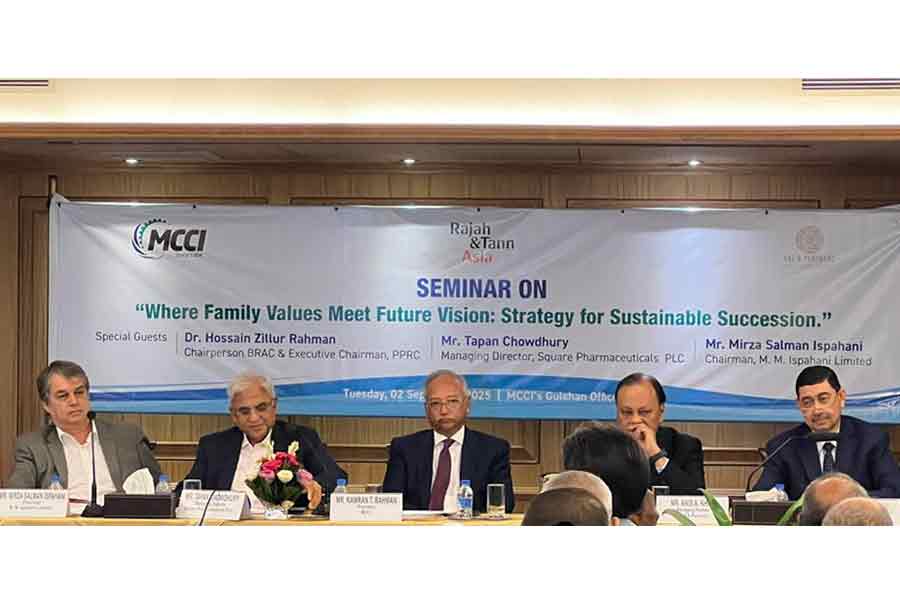Experts stress professionalism for sustainable succession in family businesses

Published :
Updated :

Business leaders and experts have called for separating ownership from management in family-owned enterprises to ensure long-term sustainability and competitiveness.
They made the observations at a seminar titled “Where Family Values Meet Future Vision: Strategy for Sustainable Succession”, jointly organised by the Metropolitan Chamber of Commerce and Industry (MCCI), Rajah & Tann Asia, and AAZ Partners in Dhaka on Tuesday.
Speakers said professional executives should be allowed to run daily operations under ethical guidelines set by owners, while governance frameworks must ensure accountability, reward leadership, and foster a culture of shared responsibility.
Delivering the keynote, Alroy Chan and Abdul Jabbar Bin Karam of Rajah & Tann Asia, Singapore, stressed the need for financial, managerial, legal, and technological support to successors. They also underscored the importance of competence-based leadership and family charters to guide succession, while calling for governance boards to oversee operations.
Mirza Salman Ispahani, managing director of MM Ispahani Ltd, said owners should refrain from interfering in routine management. “If we empower professionals—CEOs, managers, and teams—to make decisions, the business thrives. Otherwise, it suffers,” he noted, emphasising succession planning and competence over inheritance.
He also said that in 1948, during the partition, their family moved to Bangladesh, and the business began in the country.
“Over the years, it grew because of ideas, expectations, and professionalism across generations,” he added.
He also emphasized the importance of succession planning and merit-based leadership in family-owned enterprises.
“It should not always be the eldest son or daughter who takes over. Leadership must be based on competence and consensus. The family should decide who is best suited to lead, rather than assuming every child is the right choice,” he said.
He also said that family businesses thrive when governance structures are strong and when ownership does not clash with management.
“We must let go at the right time and trust the professionals and we need for planning and shared responsibility among family members,” he added.
He also said that if they prepare properly, their businesses could continue to grow across generations.
Square Pharmaceuticals managing director Tapan Chowdhury highlighted how his family’s values and trust shaped Square Group, but said sustainability requires professionalism, innovation, and governance. “It is high time decisions are taken with broader organisational interest in mind, rather than only family considerations,” he added.
He also highlighted the cultural aspects of family-run businesses, noting how personal values and traditions often intersect with organizational practices.
‘For the first generation, building trust and discipline was central. Over the years, we realized that continuity requires more than family loyalty—it requires professional management and proper governance structures,’ he added.
Former DCCI president M Saiful Islam stressed standardisation and digitisation for smooth succession. “Ninety per cent of managers in family businesses are engaged in routine tasks. Systems and technology must be institutionalised for continuity,” he said.
In his welcome address, MCCI president Kamran T Rahman said family firms remain vital for Bangladesh’s economy, but sustainable succession must be treated as a strategic priority.
MCCI director and AAZ Partners managing partner Anis A. Khan echoed that succession planning is no longer a contingency issue but a business imperative in the face of technological change and shifting demographics.
M Anis Ud Dowla, founder and chairman of ACI Group, said that good governance and proper control over the utilization of assets are essential. He added that, no matter what we do, succession needs to be improved, as no one has a clear plan for the next generation.
Feroz Rahim, group managing director of Rahimafrooz Bangladesh, said, “I represent the second generation.” “We have a family council, which we call Board Governance. We must separate governance from ownership.”
Representatives from leading business families and MCCI leaders also attended the event.


 For all latest news, follow The Financial Express Google News channel.
For all latest news, follow The Financial Express Google News channel.